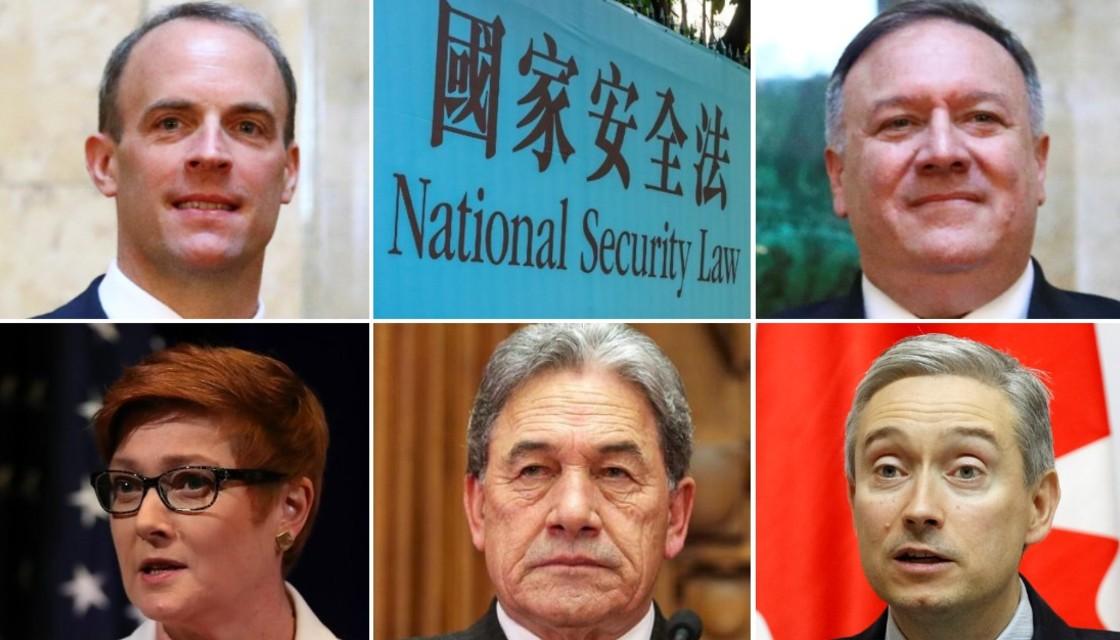New Zealand has joined its Five Eyes partners in slamming the "unjust" barring 12 of opposition candidates from running in Hong Kong's upcoming elections.
A joint statement on Sunday by the Foreign Ministers of New Zealand, Australia, Canada and the United Kingdom, as well as the United States Secretary of State, expressed "grave concern" at the "unjust disqualification of candidates".
"We support the legitimate expectations of the people of Hong Kong to elect Legislative Council representatives via genuinely free, fair, and credible elections," the statement said.

"We call on the Hong Kong government to reinstate the eligibility of disqualified candidates so that the elections can take place in an environment conducive to the exercise of democratic rights and freedoms as enshrined in the Basic Law."
The Chinese embassy in New Zealand has been contacted for a response.
Last month prominent activist Joshua Wong and 11 other opposition figures were banned from running in Hong Kong's legislative elections on September 6.
Wong described it on Twitter as one of the "biggest-ever crackdowns on the city's election" process by "disqualifying nearly all pro-democracy runners, from young progressive groups to traditional moderate parties".
The Government of Hong Kong said on June 30 the 12 nominees had been "invalidated" because their "behaviours could not genuinely uphold" the semi-autonomous city's mini-constitution, the Basic Law.
Those behaviours included "advocating or promoting Hong Kong independence", "soliciting intervention by foreign governments or political authorities" in relation to Hong Kong affairs, and not supporting a new controversial security law.
The new security law, which allows extradition from Hong Kong to the Chinese mainland for trial, led New Zealand to suspend its extradition treaty with Hong Kong. China retaliated by suspending Hong Kong's extradition agreement with New Zealand.
China accused New Zealand of "gross interference" in China's internal affairs over Hong Kong.
Foreign Affairs Minister Winston Peters said China's passing of the security law "eroded rule-of-law principles" and "undermined the 'one country, two systems' framework" that underpins Hong Kong's unique status.
"New Zealand can no longer trust that Hong Kong's criminal justice system is sufficiently independent from China. If China in future shows adherence to the 'one country, two systems' framework then we could reconsider this decision."
Prime Minister Jacinda Ardern raised concerns about Hong Kong and the treatment of Uighur Muslims in the Chinese province of Xinjiang in a speech to the Chinese business community in New Zealand last month.
She also called out China's reluctance for Taiwan - considered by China as an extension of its territory - to become a member of the World Health Organization (WHO). China doesn't consider Taiwan an independent nation and does not think it should be a member.
- 'Gravely concerned' New Zealand and security partners call for fair Hong Kong elections
- China calls for New Zealand to 'correct its mistake' after Hong Kong extradition treaty suspension
- China's crackdown: Hong Kong security law takes aim at protesters' actions
- China labels New Zealand's extradition treaty suspension as 'gross interference'
New Zealand signed a joint statement on June 30 on behalf of 27 countries expressing concern over the targeting of Uighurs and other minorities in Xinjiang and the "implications" of Hong Kong's new security law.
Hong Kong, officially named the Hong Kong Special Administrative Region of the People's Republic of China, was returned to Beijing from Britain in 1997 under the 'one country, two systems' approach.
China has said the new security legislation is necessary since sometimes violent anti-government and anti-Beijing protests have rocked the city since June last year.
Hong Kong police arrested 15 pro-democracy activists in April including Democratic Party founder Martin Lee and trade union leader Lee Cheuk-yang. They were charged with offences including organising and joining "unlawful assemblies".
Damaging certain transportation vehicles and equipment will now be considered an act of terrorism, and anyone convicted of violating the new security law will not be allowed to stand in any Hong Kong elections.





